By: Elowen Gray
As a schoolboy in the 1960s, I read On The Road by Jack Kerouac, and it left a lasting impression on me. Kerouac’s odyssey of unplanned travel to discover America—and himself—inspired my own journey, which I later wrote about in Boomer: A Memoir. My adventure began in New Zealand in 1969 and took me to Australia, the UK, Europe, Asia, South America, Central America, North America, and finally Africa in 1974/75. Though I was raised in New Zealand and remain a resident there, I traveled on a British Passport at the time to simplify visa requirements.
I traveled without modern conveniences like cell phones, computers, or GPS, relying instead on maps and recommendations from fellow travelers. What sustained me was the camaraderie of the road, along with a deep curiosity about ancient civilizations like the Greeks, Romans, Mayans, Incas, and Aztecs. History was a powerful motivator.
Along the way, I learned through trial and error, making mistakes and accumulating regrets as I grew—a vulnerability I explore openly in my book. I met incredible people and a few dangerous characters. While I mostly traveled alone, I occasionally joined others for short stretches before continuing solo. I’ve always valued solitude.
I believe my ability to undertake such a journey stemmed from my Boomer upbringing, which fostered self-reliance—a trait that seems less common today. The early sections of my book delve into this formative period. Many boomers will recognize themselves in my story, while younger readers might find my adventures intriguing, if not aspirational.
Today, some of the countries I visited are far less accessible to travelers, particularly in Asia and the Middle East. Likewise, my style of travel—hitchhiking, sleeping outdoors, riding atop trains, all on a shoestring budget with just a backpack and an alarm clock—is now far riskier and rarely advised. Boomer: A Memoir is an odyssey for those who dream of unfiltered exploration.
I wrote this book at 77, drawing from diaries, photographs, and documents I collected during my travels. Reliving those moments was deeply meaningful, and the catharsis of recounting them felt restorative. I hope you find it equally engaging.
What makes this journey distinctive is how it mirrors a generational perspective. Shaped by post-war resilience and a world before digital saturation, baby boomers experienced freedom differently, untethered by social media, GPS precision, or online bookings. Each destination held surprises, and decisions relied on instinct, curiosity, or a stranger’s advice. This approach carried risks but also fostered a rare authenticity.
In Boomer: A Memoir, readers don’t just observe a cross-continental trek—they experience the tension of uncertain borders, the grit of remote highways, and the unfiltered pulse of life as it was lived. Robert Docherty’s account avoids idealization; it’s raw, introspective, and candid. He confronts his youthful misjudgments and the perils he faced, weaving them into his broader narrative of growth.
This memoir also taps into a universal longing for adventure, self-discovery, and purpose. Whether scaling ruins in Peru or navigating Marrakesh’s markets, each experience ties together not by itinerary but by an internal compass pointing toward transformation. By sharing his story, Docherty extends an invitation to readers: to pursue their own version of freedom, wherever it may lead.
Published by Stephanie M.
















